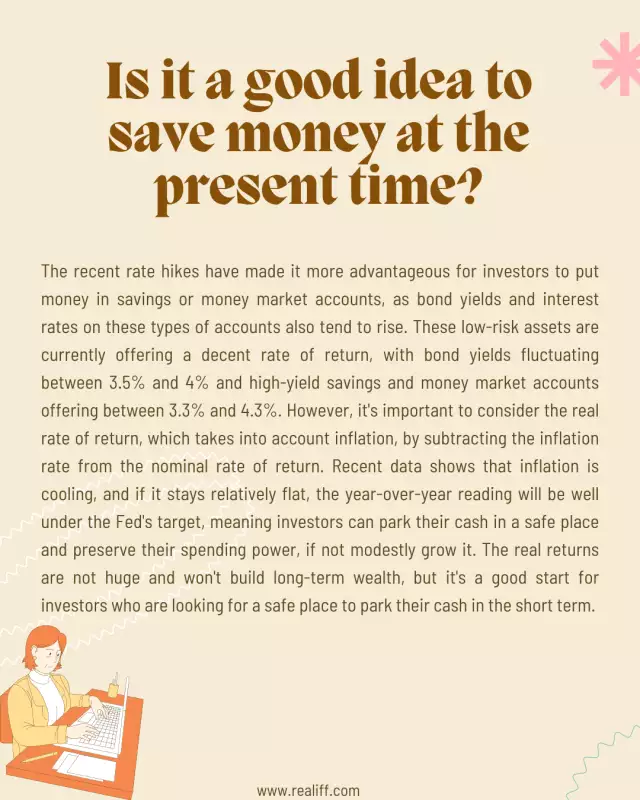Safe Places to Park Cash: Navigating Investments in a Rising Interest Rate Environment
Safe Places to Park Cash: Navigating Investments in a Rising Interest Rate Environment
Navigating the complexities of investment during periods of rising interest rates is essential for both seasoned investors and newcomers alike. With central banks like the Federal Reserve and the Bank of Canada recently increasing rates to curb inflation, understanding how these changes impact various investments can significantly influence your financial strategy. This comprehensive guide explores safe places to park cash, the mechanics of interest rates, and strategic considerations for managing your portfolio in today's economic climate.
Introduction: The Changing Landscape of Safe Investments
In recent years, finding secure, low-risk investments has been challenging. Inflation has outpaced returns on traditional savings and bonds, eroding purchasing power and leaving investors searching for safer options. However, with the recent interest rate hikes, the financial landscape is shifting, providing new opportunities for preserving and potentially growing your capital. This article delves into these developments, offering insights into how to effectively manage your investments during these times.

Understanding Interest Rates and Their Impact
What Are Interest Rates?
Interest rates represent the cost of borrowing money or the return on savings, typically expressed as a percentage of the principal amount. When you take out a loan, you pay interest to the lender as the cost of borrowing. Conversely, when you deposit money in a savings account or purchase bonds, you earn interest on your investment. These rates are influenced by various factors, including the borrower’s creditworthiness and broader economic conditions.
How Are Interest Rates Determined?
Central banks, such as the Federal Reserve and the Bank of Canada, play a pivotal role in setting policy interest rates, which influence the rates that banks and other financial institutions charge consumers. These policy rates are adjusted based on economic indicators, such as inflation and employment levels, to either stimulate economic activity or control inflation. When central banks raise rates, borrowing costs increase, while saving becomes more attractive due to higher returns.
The Impact of Rising Interest Rates on Investments
Savings Accounts and Money Market Funds
With recent rate hikes, savings accounts and money market funds are offering more competitive returns. Previously, these accounts provided minimal interest, failing to keep pace with inflation. Now, bond yields range between 3.5% and 4%, and high-yield savings accounts offer returns between 3.3% and 4.3%. While these returns might not be substantial for long-term wealth building, they provide a secure place to park cash, preserving capital in a low-risk environment.
Bonds and Fixed-Income Securities
The relationship between bond prices and interest rates is inversely related. As interest rates rise, the prices of existing bonds fall because new bonds are issued with higher yields, making older bonds less attractive. However, higher rates on new bonds present better returns for investors. This makes bonds appealing during periods of rising rates, despite potential declines in the value of existing bonds.
Stocks and Equities
Rising interest rates can also impact the stock market. Higher borrowing costs can reduce corporate profits, leading to lower stock prices, particularly in sectors reliant on debt, such as real estate and utilities. Conversely, financial sector stocks may benefit from higher rates due to increased profit margins on loans. As investors shift from equities to fixed-income investments, stock prices can be further influenced.
Strategic Considerations for Managing Investments
Evaluating Your Investment Portfolio
In response to rising interest rates, it’s crucial to review your investment portfolio. Assess whether your current asset allocation aligns with your financial goals, risk tolerance, and investment horizon. While it might be tempting to adjust your investments quickly, it’s essential to consider the long-term impact on your returns.
Exploring Low-Risk Investment Opportunities
Higher interest rates make low-risk investments like savings accounts, money market funds, and short-term bonds more attractive. These options provide stable returns and protect your capital from inflation, making them suitable for short-term savings and emergency funds.
Managing Debt Wisely
Rising interest rates increase borrowing costs. For homeowners with variable-rate mortgages, this means higher monthly payments. Refinancing to a fixed-rate mortgage can lock in your payments and provide financial stability. Additionally, prioritize paying off high-interest debt, such as personal loans and credit cards, to reduce your financial burden.

How Interest Rates Affect Different Investment Vehicles
Equities and Mutual Funds
Interest rate hikes typically lead to increased borrowing costs for companies, reducing their profits and potentially lowering stock prices. Sectors like technology and real estate, which rely heavily on financing, are often the most affected. However, the financial sector may benefit from higher rates due to improved profit margins. Investors should consider these dynamics when adjusting their equity holdings.
Bonds and Bond Funds
Newly issued bonds in a rising interest rate environment offer higher returns, making them appealing to investors. However, existing bonds with lower yields may decrease in value, especially those with longer maturities. Investors holding bonds through mutual funds or ETFs might see the value of their holdings fluctuate as the market adjusts to new rates.
Real Estate Investments
The real estate market is particularly sensitive to changes in interest rates. Higher rates lead to higher mortgage costs, which can reduce demand for property purchases and potentially lower real estate prices. However, real estate investment trusts (REITs), especially those focused on income-generating properties, may still offer attractive returns.
Recent Developments and News
In recent months, central banks have been actively adjusting interest rates to manage economic conditions and control inflation. The Federal Reserve and the Bank of Canada have implemented several rate hikes to curb rising prices and stabilize the economy. These actions have significant implications for investors, as higher rates can change the landscape of investment opportunities and risks.
Expert Insight
"Understanding how interest rates influence various asset classes is critical for making informed investment decisions. During periods of rising rates, it's essential to focus on diversifying and considering safe, income-generating assets to preserve capital and achieve steady growth." — Barbara Corcoran, Real Estate Mogul and Business Expert.
Essential Questions About Interest Rates and Investments
Q. Why do interest rates affect investment
returns?
A.Interest rates impact borrowing costs and the
returns on savings, influencing the profitability and
attractiveness of different investments.
Q. When should investors be concerned about rising interest
rates?
A.Rising rates should be a concern when they
increase borrowing costs, affect corporate profits, and make
fixed-income investments more appealing compared to equities.
Q. Where can I find safe investment options during rising
interest rates?
A.Safe options include high-yield savings
accounts, money market funds, and short-term bonds, which provide
stable returns with minimal risk.
Q. What types of investments benefit from rising interest
rates?
A.Financial sector investments and newly issued
fixed-income securities often benefit from rising rates due to
higher returns and improved profit margins.
Q. Who is most affected by changes in interest
rates?
A.Borrowers with variable-rate loans, companies
with significant debt, and investors in interest-sensitive sectors
are most impacted by changes in interest rates.
Q. How can I adjust my investment strategy during rising
interest rates?
A.Diversify into low-risk, income-generating
assets, pay off high-interest debt, and assess the impact on equity
investments to adjust your strategy effectively.
The Most Comprehensive Tips for Managing Investments During Rising Interest Rates
- Review Your Asset Allocation:Regularly assess whether your portfolio aligns with your financial goals and risk tolerance, especially during economic shifts.
- Consider Low-Risk Investments:Explore options like savings accounts, money market funds, and bonds to preserve capital and earn stable returns.
- Refinance High-Interest Debt:Convert variable-rate loans to fixed rates to lock in payments and reduce future financial strain.
- Diversify Your Portfolio:Spread your investments across different asset classes to mitigate risk and enhance potential returns.
- Stay Informed:Keep up with economic news and central bank policies to anticipate and respond to interest rate changes.
- Consult a Financial Advisor:Seek personalized advice to navigate the complexities of interest rate impacts on your investments.
- Evaluate Long-Term Goals:Maintain focus on long-term financial planning rather than reacting to short-term market fluctuations.
- Monitor Inflation:Adjust your expectations for the real rate of return, considering inflation to maintain your purchasing power.
Conclusion
Navigating the challenges of rising interest rates requires careful planning and strategic adjustments. By understanding how these rate changes affect different asset classes, you can make informed decisions that align with your financial goals. Focusing on low-risk investments, managing debt wisely, and staying informed are crucial steps to preserving and growing your capital during economic shifts.

Realiff.com stands out as a valuable resource in navigating these complexities. With its AI-driven technology and diverse real estate listings, Realiff offers insights that empower both buyers and sellers. Timing your transactions, understanding market dynamics, and utilizing strategic tools can significantly enhance your real estate journey. By leveraging these resources, Realiff.com helps users confidently maneuver through the real estate landscape, making informed decisions and optimizing their investments.

